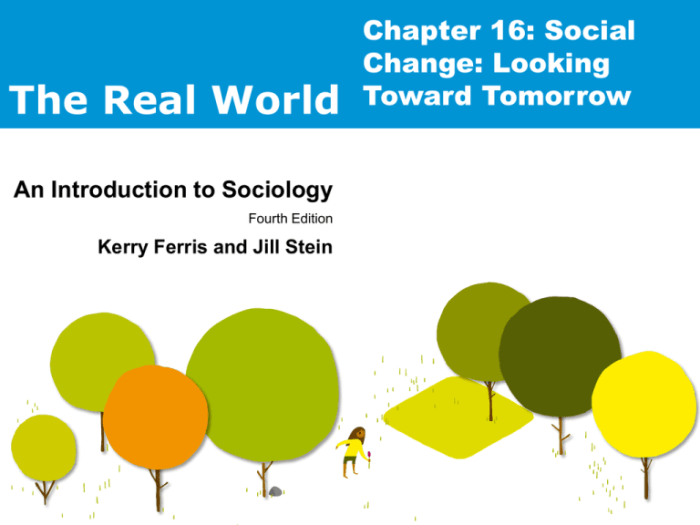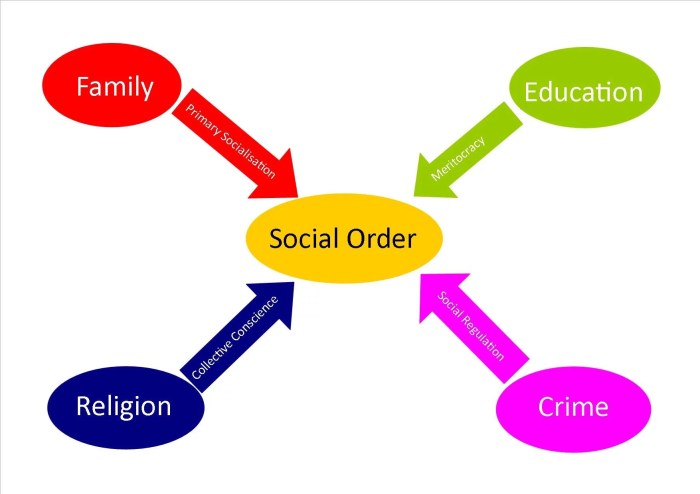The real world an introduction to sociology eighth edition – Introducing The Real World: An Introduction to Sociology, Eighth Edition, a comprehensive exploration into the fascinating world of sociology. This text provides a profound understanding of the discipline’s purpose, key concepts, and practical applications, guiding readers through the intricate tapestry of human behavior and societal structures.
Delving into the depths of sociology, this edition unravels the complexities of culture, socialization, and social stratification, shedding light on the forces that shape our lives and the world around us. Prepare to embark on an enlightening journey as we uncover the dynamics of social institutions, navigate the currents of social change, and ponder the future of our societies.
Sociology and the Real World

Sociology is the scientific study of human behavior and society. It examines the social forces that shape our lives, from our relationships to our work to our political beliefs. Sociology provides us with a way to understand the world around us and to make informed decisions about our lives.
The key concepts in sociology include:
- Culture:The shared beliefs, values, and norms that shape our behavior.
- Social structure:The organized patterns of relationships and institutions that exist in society.
- Social interaction:The process by which people communicate and exchange information.
Sociology can be applied to a wide range of real-world problems, such as:
- Crime:Sociologists study the causes of crime and develop strategies to prevent it.
- Education:Sociologists study the role of education in society and develop ways to improve educational outcomes.
- Health:Sociologists study the social factors that affect health and develop ways to improve public health.
Culture and Society

Culture is the shared beliefs, values, and norms that shape our behavior. It includes everything from the way we dress to the way we celebrate holidays. Culture is learned through socialization, the process by which we learn the values and norms of our society.
There are many different types of cultures, and they can vary greatly from one society to another. Some cultures are more individualistic, while others are more collectivist. Some cultures are more traditional, while others are more modern.
Globalization is having a major impact on culture. As people from different cultures come into contact with each other, they are sharing their ideas and values. This is leading to the creation of new cultures that are a blend of different traditions.
The Impact of Globalization on Culture and Society
- Increased cultural diversity:Globalization has led to increased cultural diversity in many societies. This can be seen in the growing number of ethnic restaurants, cultural festivals, and religious groups.
- Cultural hybridization:Globalization has also led to the creation of new cultures that are a blend of different traditions. For example, some Asian countries have developed a unique blend of Eastern and Western culture.
- Cultural conflict:Globalization can also lead to cultural conflict. This can occur when people from different cultures have different values and beliefs.
Socialization and the Life Course: The Real World An Introduction To Sociology Eighth Edition

Socialization is the process by which we learn the values and norms of our society. It begins in childhood and continues throughout our lives. The agents of socialization include our parents, teachers, peers, and the media.
Socialization has a profound impact on our lives. It shapes our beliefs, values, and behaviors. It also affects our ability to succeed in school, work, and relationships.
The life course is the sequence of social roles and statuses that we occupy over our lives. It includes stages such as childhood, adolescence, adulthood, and old age. Each stage of the life course presents its own unique challenges and opportunities.
Challenges and Opportunities at Different Stages of the Life Course, The real world an introduction to sociology eighth edition
- Childhood:The challenges of childhood include learning to socialize, develop a sense of self, and cope with the demands of school.
- Adolescence:The challenges of adolescence include developing a sense of identity, coping with the physical and emotional changes of puberty, and establishing relationships with peers.
- Adulthood:The challenges of adulthood include finding a job, starting a family, and raising children.
- Old age:The challenges of old age include coping with retirement, the loss of loved ones, and declining health.
Quick FAQs
What is the primary focus of sociology?
Sociology primarily focuses on the study of human behavior, social interactions, and the patterns that emerge from these interactions.
How does sociology contribute to our understanding of the world?
Sociology provides a framework for analyzing social phenomena, enabling us to comprehend the complexities of human societies and identify factors that influence our actions and experiences.
What are some key concepts in sociology?
Key sociological concepts include culture, socialization, social stratification, social institutions, and social change, which provide a foundation for understanding the dynamics of human societies.
How is sociological research conducted?
Sociological research employs various methods, including surveys, interviews, observations, and data analysis, to gather and interpret information about social phenomena.
What are the applications of sociological knowledge?
Sociological knowledge is applied in diverse fields, such as social policy, education, healthcare, and business, to address social issues, promote social justice, and enhance our understanding of the human condition.